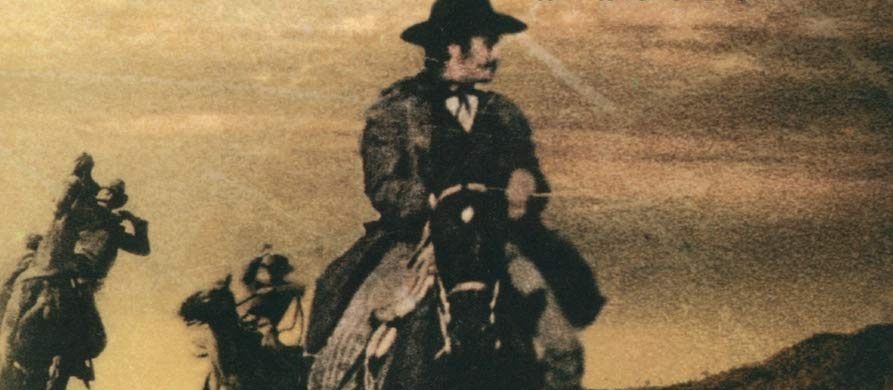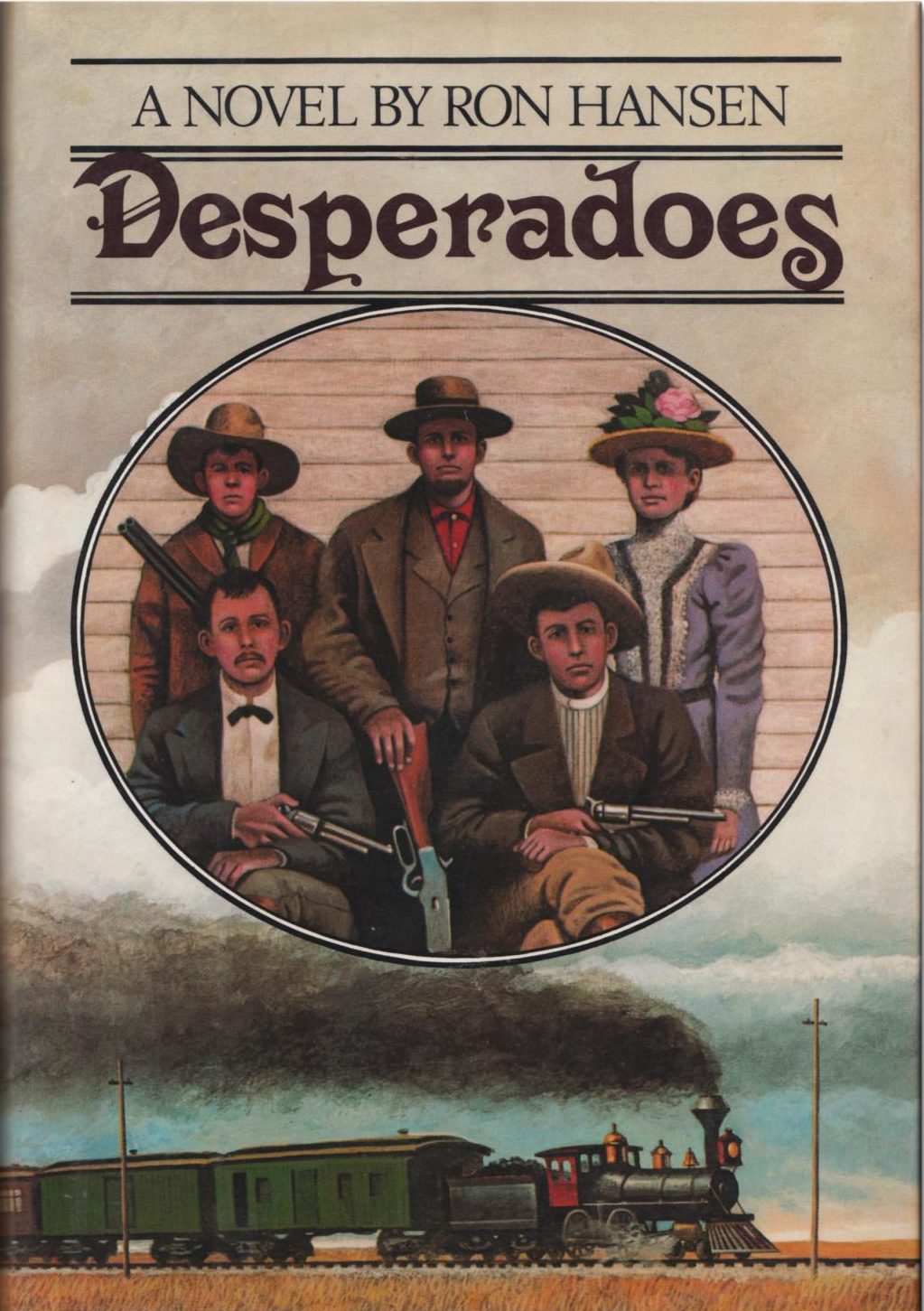

“I wanted to be a saint back then. I wanted to be as great a lawman as Pat Garrett, as noble as King Arthur’s knights. I don’t know where those notions went but I think they’ve vanished forever. Thievery isn’t my vice anymore; it’s my habit.”
Ron Hansen came on my radar by way of Andrew Dominik’s adaptation of his second novel, The Assassination of Jesse James by the Coward Robert Ford, which I happen to consider one of the greatest Western films of all time. Hansen’s Jesse James is in my queue, but I thought it prudent to begin with his debut novel, Desperadoes, before digging into the source novel of the movie I adore so much. Desperadoes chronicles the exploits of the Dalton Gang, a band of outlaws that stirred up trouble for a few brief years in the late 1800s. Among them were four of the nine Dalton brothers: Bob, the inspired leader; Grat, the rambunctious fighter known for brawling in bars; Bill, the politician who kept his hands clean but acted as spy and advisor to his brothers; and Emmett, the youngest, who tagged along. Inspired by the exploits of Frank and Jesse James (the James-Younger game had dissolved about a decade before the Dalton Gang emerged), the gang robbed banks, pulled off train heists, rustled cattle, bootlegged, murdered—the whole nine yards, whatever it took to make ends meet. Their story is a prototypical tale of the Old West, which Hansen records in a neat telescoping style filtered through the memories of Emmett Dalton, the only gang member to survive the infamous Coffeyville bank robbery attempt that effectively ended their reign of terror.
Desperadoes is written as a fictional memoir from the perspective of an aging Emmett, who survived the robbery attempt that left his brothers dead despite being shot twenty-three times. After serving fourteen years of a lifetime sentence, he was pardoned by the governor, married his childhood sweetheart, moved to California, wrote several books about the Daltons’ misadventures, acted as himself in a film adaptation of one of them, and sold real estate. This time-spanning vantage—as Emmett looks back at the folly of his youth from the comfort of his Los Angeles home, reminiscing about his departed brothers and their criminal adventures—serves as a poignant lens through which to view the misguided ambitions of the young Dalton boys. His story is an attempt to lay the full truth out in the open, to reveal the entire scope of the outlaw band’s fearsome reign, even if that means contradicting the romantic portrayal of them in popular media.
Bob and Grat were initially employed by the government, working as deputy marshals in the stead of their brother Frank, who was killed by whiskey bootleggers. Emmett soon joined as well and the brothers fell into the habit of stealing horses to supplement their income. Forced to flee and discredited as enforcers of the law, they decided to simply disregard it entirely and fashion for themselves a life of crime. As their renown grew so did their numbers, with names like “Blackfaced” Charlie Bryant, “Bitter Creek” Newcomb, Bill Doolin, Dick Broadwell, Bill Powers, and Charley Pierce joining in the outlawing. Also assisting the gang was Eugenia Moore, a schoolteacher and Bob’s sometimes lover, who helped orchestrate the gang’s criminal activities. Even as they pressed on into outlaw celebrity and increasingly shocking levels of criminal ambition, the Daltons tried to carve out time for relatively normal lives, appearing at family reunions, entertaining girlfriends, exchanging letters with their law-abiding kin. Their exploits came to an end in Coffeyville, Kansas, where they tried to “beat anything Jesse James ever did” by robbing two banks at once. They failed and eight people died over the course of twelve bullet-filled minutes.
They were all pretty despicable people, save Emmett, who softens the severity of his own misdeeds because, well, he survived so he got to write about them. But by the time you reach the end of the novel, you’ve spent so much time with them and gotten to know their personalities and the interesting camaraderie they shared that you feel a pang of sadness when they go down.
So my brother stared at the body of a man with no more face than a plate of food and he puked into the straw and swore God’s own vengeance on the wicked.
Hansen writes the robberies and shootouts with a terrifically thrilling matter of factness that manages to convey a strong sense of physicality and violence without losing the dual senses of historicity and contrived storytelling. In order to skirt the issue of Emmett’s limited perception of the events in question, he tells us that Emmett corresponded by letter with friends and even former adversaries during his time in prison. This allows the author to weave together Emmett’s first-person account with a semi-omniscient narrative. Since this is Hansen writing historical fiction in the voice of a historical character, it’s easy to let oneself get sucked into the details and believe everything as true. And much of it is—though I’m not knowledgeable on the subject myself, Hansen clearly did his research. More than placing the historical figures in the right locations at the right times and concocting solid dialogue between a large cast of characters, Hansen’s grasp of the flavorful language is remarkable. Not quite McCarthy-esque, but then again McCarthy usually gets a bit too linguistically pretentious for my tastes.
They watched the sun go down from the porch swing with their coffee cups and saucers in their hands. They lay on top of clean linen sheets and saw the morning sun whenever a breeze pushed the bedroom shade. He told her again about the thousand longhorn cattle they’d have on the ranch in Bolivia or Argentina where the pasture grass grows so high it tickles your chin. She told him about the white plaster walls and the red tiles on the floor and the orange flowers in vases of crystal. She told him she’d wear a sun hat and carry an easel down to the beach where she’d paint pictures of the surf and sea gulls and South American fishing trawlers.
What doesn’t quite come through until the closing pages is the celebrity angle. It becomes clear that without the inspiration of Jesse James, Bob Dalton might have been content as a ranch hand. He’d have never convinced his brothers to steal horses, and then to rob a train, and then to try to rob two banks simultaneously. But even in those days, the American public encouraged such behavior by putting the names and faces of outlaws all over the place and romanticizing their exploits. Billy the Kid, Bonnie and Clyde, Al Capone, Charles Manson, Ted Kaczynski, etc. In the end, this quest for fame leads to a hubristic sense of invincibility, poetically rendered in the book’s climax, where Bob confidently plugs away with his rifle as bullets whiz past his head, as if he doesn’t believe the lawmen are actually shooting to kill. In death, brothers Bob and Grat are handcuffed and stood upright for a picture, teenage girls snip locks of their hair, and their belongings are distributed among the witnesses as souvenirs. Receiving care from a doctor in the aftermath, Emmett refuses to let his arm be amputated because he believes it will be placed in a pickling jar and passed around as a county fair attraction.
Though it suffers slightly from the sheer number of characters who briefly impact the story only to be forgotten, Ron Hansen’s debut novel is an entertaining Western that doubles as an interesting critique of celebrity culture. A strong first novel for Hansen, and one that gets me excited to take a look at some of his subsequent work.